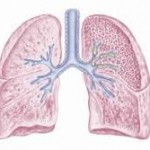 In the United States, COPD affects approximately 16 million adults, and is one of the fastest growing causes of morbidity and mortality. Exacerbations of COPD are responsible for > 2.4% of all acute medical hospital admissions and constitute the most important direct health-care costs associated with COPDA In the United States, the mean cost of hospital admission for COPD in a cohort of patients with severe COPD was estimated to be $7,100 (in US dollars).
In the United States, COPD affects approximately 16 million adults, and is one of the fastest growing causes of morbidity and mortality. Exacerbations of COPD are responsible for > 2.4% of all acute medical hospital admissions and constitute the most important direct health-care costs associated with COPDA In the United States, the mean cost of hospital admission for COPD in a cohort of patients with severe COPD was estimated to be $7,100 (in US dollars).
Exacerbations of COPD can be triggered by a variety of factors, such as viruses, bacteria, and common pollutants. Thus, corticosteroids, anti-oxidants, and antibiotics may all have beneficial effects in treating or preventing some episodes, Antibiotics have demonstrated a marginal efficacy in the treatment of exacerbations of COPD. Nevertheless, a recent survey including 69,820 patients who had been hospitalized for exacerbations of COPD in 360 hospitals throughout the United States showed that 85% of all patients were given antibiotics. Not all patients will equally experience benefit from antibiotics. Subgroups of patients selected by evidence of bacterial infection or by severity of illness are more likely to benefit than those patients who are less ill. Therefore, the definition of a biomarker, which potentially detects such episodes or is specific to one subtype of exacerbation would be of great interest.
Serum levels of procalcitonin increase rapidly in the presence of infection. The ubiquitous release of procalcitonin during infections is induced either directly by microbial toxins (eg, endotoxin) and/or indirectly by humoral factors or the cell-mediated host response.- This induction is rather attenuated by cytokines released during viral infec-tions. Therefore, circulating levels of procalcitonin are markedly elevated in patients with bacterial infections compared to those with viral infections or other inflammatory conditions.
In previous studies,- procalcitonin guidance markedly and safely reduced antibiotic prescriptions and the duration of antibiotic therapy in patients with lower respiratory tract infections. Therefore, we hypothesized that procalcitonin concentrations can serve as a marker for different antibiotic prescriptions in patients who are experiencing exacerbations of COPD. To test this hypothesis, we conducted a study in which we prospectively randomized patients presenting with an exacerbation of COPD (ECOPD) to be treated according to internationally accepted guidelines (ie, the standard-therapy group) or to procalcitonin levels (ie, the procalcitonin group) on hospital admission.


















